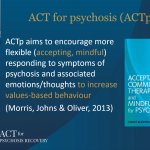Recovery ACT: feasibility & acceptability of Group Acceptance and Commitment Therapy for people with psychosis (ABCT 2020)
Our team had the fortunate opportunity to present a paper at the ABCT 54th Annual Convention on group ACT for people with psychosis. Thanks to Dr Lyn Ellett from Royal Holloway University of London for organising the symposium on “Mindfulness and Acceptance Based Approaches for Psychosis: Current Evidence and Future Directions” where I presented the …






